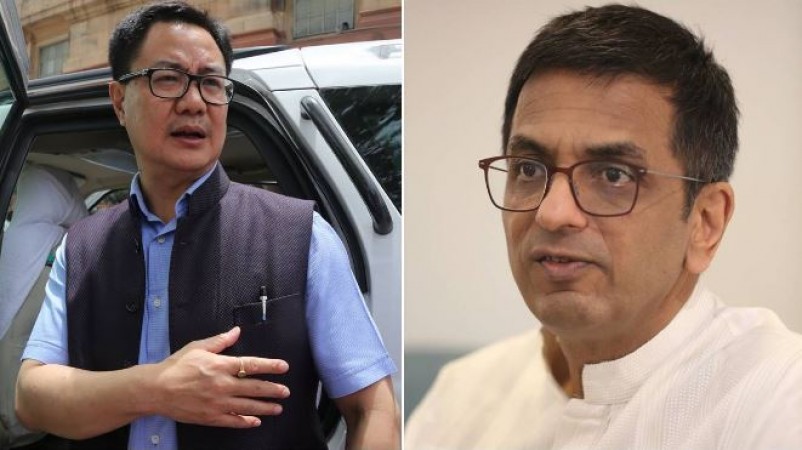
New Delhi: The Central Government has written to the Chief Justice (CJI) DY Chandrachud saying that the government should also be represented in the collegium of the Supreme Court and High Courts. According to media reports, Union Law Minister Kiren Rijiju has written a letter to CJI Chandrachud that there must be a representation of the Central Government in the Supreme Court Collegium and State Governments in the High Court Collegium, as it is essential for transparency.
Union Law Minister Kiren Rijiju has said that he is not satisfied with the present collegium system for the appointment of judges. The Law Minister has again favored the restoration of the National Judicial Appointments Commission (NJAC) in place of the Collegium. Kiren Rijiju says that the government's role in the appointment of judges was very important because judges do not have all the reports and necessary information that the government has.
Let us tell you that Kiren Rijiju has already said that the government cannot be put in the dock just because it did not approve the names suggested by the collegium. It is not the job of the government to just blindly approve the names recommended by the collegium. However, on the other hand, the Supreme Court also has its own view on this argument of Kiren Rijiju and the government. Justice SK Kaul and Justice Abhay S. Oka's bench have said that if the government has any objection to any name suggested by the collegium and the committee, then it should tell about it. However, it is not right to withhold names in this manner.
Let us tell you that amidst the controversy over the Collegium system, CJI Chandrachud had recently said that no institution in a constitutional democracy is 100% perfect, and the collegium system for the appointment of judges is also not beyond this. Let us tell you that the present collegium of the Supreme Court consists of five senior judges headed by the CJI. In addition to CJI Chandrachud, this collegium includes Justice Sanjay Kishan Kaul, Justice KM Joseph, Justice MR Shah, and Justice Ajay Rastogi. However, none of them is in the race to become the next Chief Justice after Justice Chandrachud.
It is noteworthy that Law Minister Kiren Rijiju's letter has come at a time when there has been a tussle between the Supreme Court and the government over the appointment of judges. The judiciary is of the view that the government is once again seeking to interfere in the appointment of judges through the back door, as was the case with the National Judicial Appointments Commission (NJAC) before the collegium.
What was the National Judicial Appointments Commission (NJAC) Act?
The National Judicial Appointments Commission (NJAC) Act was passed by the Parliament in 2014. In this, the chairman of NJAC was also the Chief Justice (CJI) of the Supreme Court. Along with this, along with two senior judges, the law minister, and two other important personalities were included. He was elected by a panel headed by the Prime Minister, including the Leader of the Opposition and the CJI himself. However, in October 2015, a five-judge bench of the Supreme Court struck down the NJAC, terming it unconstitutional.
Union Budget 2023-24: Space industry seeks PLI scheme, tax incentives
Wholesale inflation reaches lowest level in 22 months
EC'S all-party meeting to discuss Remote Voting Machine underway